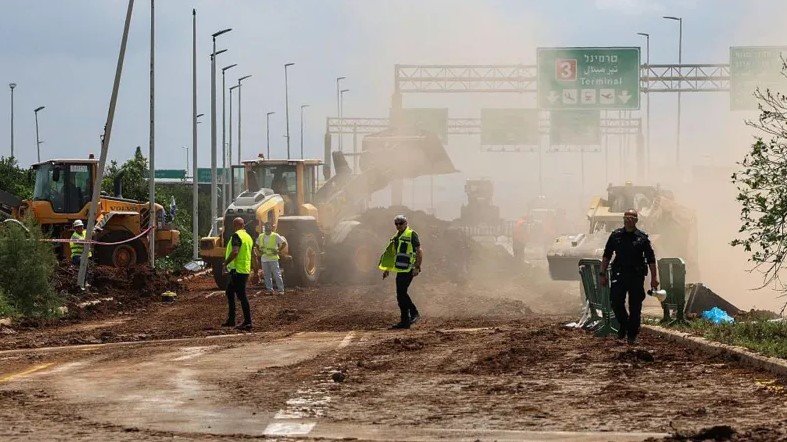The Houthi missile’s near-strike is considered a provocation, attacking Iraq’s most important airport. Netanyahu has said that he will respond with anything it takes.
Tel Aviv, Israel – The ongoing tension in the region has reached new heights after a missile reportedly shot by the Yemeni Houthi rebels exploded near Ben Gurion International Airport within Israeli borders. Even though no significant injuries or destruction were recorded, the security measures associated with the region have escalated along with Netanyahu’s fierce response after such an attack was expected.
Netanyahu made these comments during an emergency broadcast on television amid an airstrike at the Israeli Defense Ministry in Tel Aviv Thursday night. The minister continued, “This was not merely an attack on Israel – it infringed on our national sovereignty, the economy, as well as the security of our citizens and guests.” Pending no response is issued, we will respond. Firmly and without hesitation.”
What Happened?
Confirming Israeli military officials, air sirens were activated across Central Israel regions, including Tel Aviv, around 14:35 local time. A few moments later, a projectile incoming constructed and exploded mid-air as it was intercepted by Israel’s Iron Dome defense system. Shreds of the blast are said to have landed on agricultural land a mere five kilometers away from Ben Gurion Airport’s eastern perimeter.
As per the IDF (Israel Defense Forces) intelligence report, the missile was fired from a Houthi-held region in Yemen and identified as a Badr-1 ballistic missile. The movement governing this Western Yemeni region has yet to make any formal claim, however, a pro-Houthi Telegram account is known to have praised the operation by calling it “ a message to Zionist aggression”.
In Regional Context
The incident has drawn ire from the allies of the West and the Israeli regime at the same time, which indicates they are somehow unified over something. The United States, primary funding sponsor of Israel, condemned the attack at once. US Secretary of State Antony Blinken went in front of the cameras, stating:
Weird, the lot talks at once and goes like “this continues escalation”. If the region were not so calm, one would feel somewhat sorry for the Houthis. All in all, the people about US foreign policy are used to hearing “ Israel is our ally, they can do no wrongdoing.” I am also sorry about the unsounded attitude from the guys in ethics assertives in the U.S.
Effects on Global Civil Aviation
In the context of trajectory missile intercepts crossing international boundaries, the aforementioned incident is bound to create some form of international travel disturbance. The Israeli Airports Authority, for its part, undertook precautionary measures within the framework of ensuring safety conditions for passengers, in the first several minutes following the intercept by stopping all flight operations into and out of Ben Gurion Airport for roughly three-quarters of an hour. A number of flights were routed to Ramon Airport, located in the southern region of Israel, and also to Cyprus at Larnaca.
All commercial airline operators surveying the border of Israel received a warning red alert by the Authority, urging measures to be taken under the instruction “stay vigilant” and “make readiness for sudden shift or move on booking changes”.
As an example, the leading company of Israeli flight El Al, stated they are adjusting their flight paths and increasing their collaborations with security bodies at this time, and increasing collaboration with authorities over national security. On the other side of the spectrum, Lufthansa, British Airways, and the Emirates suspended evening flights bound to Tel Aviv and Tel Aviv-bound planes, citing pending security changes as the reasons to justify the stops.
Netanyahu’s Response Strategy
In a national address, Prime Minister Netanyahu, supported by Defense Minister Yoav Gallant and Mossad Chief David Barnea, mentioned what he referred to as “an extension of Iranian-backed terrorism” and announced in advance a “multi-layered response” which, as he put it, would deal with the matter.
He did not provide any specific details pertaining to the military strategies, but indicated that communication bonds had been shifted to new partners such as Egypt, Saudi Arabia, and the United States, which, like the Israeli government, are increasingly concerned with Houthi violence, and affirmed that he had received Cabinet approval to “eliminate” the purported dangers causatively the Houthi power.
“Proxies of terror, no matter where they come from, will not ever be permitted to endanger Israeli airspace or the safety of our civilians,” Netanyahu claimed.
Implying, as has always been the case, that Iran is deeply linked to the scuffle as the main arms and confidential information provider is fueling the Houthi faction. “Make no mistake—those who supply and support the Houthis cannot be ignored either. Our counteraction will be formulated against an entire network of terrorism.”
Military and Intelligence Assessment
Military analysts argue that the attack represents a significant escalation in the operational range of the Houthis and could suggest enhanced external sponsorship with regard to missile capabilities or logistics.
During a morning briefing, IDF spokesman Rear Admiral Daniel Hagari reviewed the event, stating, “Our radar systems tracked the projectile’s trajectory, and it was successfully intercepted before reaching the populated area. Nonetheless, this was uncomfortably close to a national asset of strategic importance.”
Some Iranian sources suggest that the strike is meant to signal intent rather than be a full-scale offensive. The suggestion is that the strike is intended to test Israel’s retaliatory capabilities for Israeli operations in the Red Sea related to Iranian supply routes.

Wider Implications for Regional Conflict
Meanwhile, Houthi missile strikes come alongside increased endeavors in the Red Sea, where the group targets international shipping in retaliation for what Houthi leaders refer to as Western involvement in the Gaza conflict. In the past 6 months, US and UK naval vessels have thwarted multiple sponsored missile and drone threats to cargo ships from Yemen.
As the Gaza conflict is further compounded by Iranian control over armed proxy actors in Lebanon, Iraq, and Yemen, these developments most strongly concern the prospect of a multi-front war.
A warning from Hebrew University Middle East Security expert Dr. Lior Zamir puts forth the statement:
“If the Houthis start regularly trying to hit Israeli territory, it sets a very dangerous precedent. It essentially opens a southern danger vector that Israel has never had to seriously worry about before. This complicates an already complex, unstable regional security order.”
Public Response and Readiness
The level of threat posed by missiles is something that Israelis have unfortunately grown accustomed to. However, targeting territory so close to the main airport has triggered agitated reactions. Social media is rife with clips showing suspended flights and frantic holidaymakers, alongside families expressing concerns that the conflict is spiraling out of control.
As is customary with these types of situations, the regional alert level has been raised alongside drills executed at key infrastructure locations. The Home Front Command has enacted these changes while schoolchildren near the airport were instructed to temporarily leave their premises as the spaces are searched for dangerous materials.
Table of Contents
What Comes Next?
The close encounter at Ben Gurion Airport might mean more than just an accidental strike of a rogue missile; it possibly symbolizes an escalation of the regional militia’s campaign to take advantage of Israel’s existing conflicts and widen new battle fronts. As the Israeli cabinet mobilizes its strategy, the next few days will decide if the regional situation is an alarming escalation or a miscalculated reaction to a new peril.
At this moment, Israel stays vigilant while the world observes.



